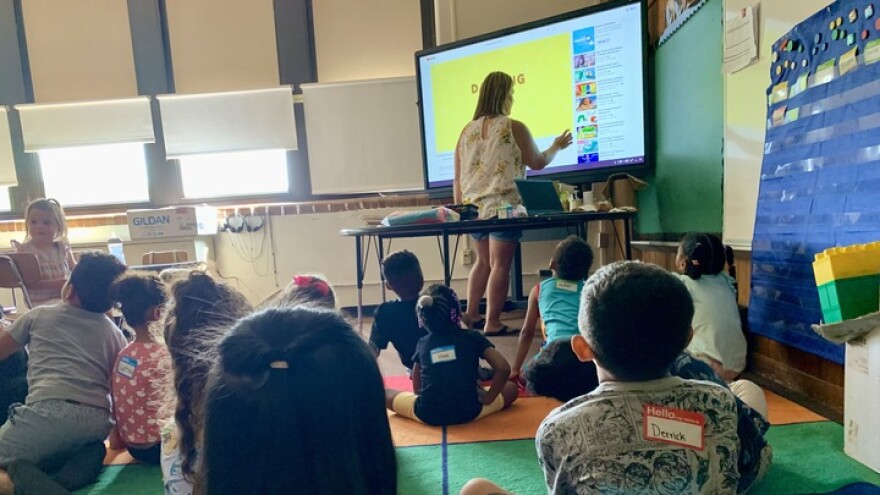COMMENTARY: Pa.’s early learning crisis | Providers shoulder heavy burden as hibernating lawmakers leave bills unpaid
By Charles Donofrio, president and CEO of Lehigh Valley Children’s Centers
Every working parent who sends their 3- or 4-year-old to a “free” pre-kindgergarten classroom under the Pre-K Counts (PKC) or Head Start Supplemental Assistance Program (HSSAP) programs should pause and ask: Who is paying?
In theory, the state of Pennsylvania underwrites these seats so that low‐ and moderate-income families can access high-quality early learning at no cost. In reality, providers — early learning centers, Head Start operators, and school districts are being forced to absorb costs and wait for state funding, while the regulatory demands mounted by the Pennsylvania Office of Child Development and Early Learning (OCDEL) and elected officials continue to grow.
The result: a system that is broken and failing the children it is meant to serve.
Impasse leaves providers hanging
Pennsylvania is currently operating without a passed budget for the fiscal year that began July 1. The impasse is more than a procedural headache. It is disrupting many providers of early learning services. As reporting shows:
- Over 3,200 Pre-K providers are being denied payment for more than 66,500 slots because of the budget delay.
- In Philadelphia alone, dozens of preschool providers report they’ve been operating several months without payment for PKC seats, draining savings, drawing on lines of credit, and in some cases preparing to close classrooms.
- A survey of 95 PKC and HSSAP providers in 32 counties found they had collectively taken on nearly $20 million in loans (average interest about 7.5%) to stay open while state funding was frozen.
- •OCDEL itself documented planned or actual closure/delay of classrooms affecting more than 4,000 seats across the Commonwealth.
In short: While the children are in seats today, many of the providers are financing that service themselves, incurring debt, and facing the risk that the state will never catch up.
Regulations without resources
Simultaneously, providers are facing increased regulatory burdens: more frequent monitoring, more data and reporting requirements, a full rebid of grants every five years that must be navigated even as funding is uncertain.
The logic is flawed. On the one hand, the state demands high‐quality, high‐regulation early learning (which is creditable). On the other hand, the state fails to timely provide the funding to enable providers to meet those standards.
Providers are being asked to deliver “state-mandated quality” at their own cost until the state catches up. That effectively shifts the risk from public funding onto private and nonprofit providers, undermining the promise of “free” pre-K for families and stability for programs.
At the center of this breakdown are the elected officials in Harrisburg and the structure of regulatory oversight. When the state mandates programs, sets quality metrics, requires data, and positions itself as the funder of “free” services, it must follow through financially.
Instead, the mismatch between regulatory requirements and funding flows creates a structural injustice. Early learning providers are doing the heavy lifting to meet public expectations, while elected officials leave the bill unpaid.
The current impasse is not a bureaucratic decision; it is a deliberate or negligent abandonment of responsibility. The state’s constitution requires a balanced budget by June 30 each year. Pennsylvania enters fiscal year 2025-26 without a passed budget, meaning providers remain in limbo.
What must change
To restore the integrity of the system, several things need to happen:
1. Pass a full state budget immediately with line‐items for PKC, HSSAP and early learning provider payments clearly funded, paying all outstanding obligations.
2. Ensure timely flows of funds to providers — if providers must deliver services on July 1, the contracts must be executed or bridge funding secured without forcing providers to borrow at high interest or absorb costs themselves.
3. Align regulatory demands with funding realities — if OCDEL requires more data, higher wages, better facilities, more professional development, then the funding must match those requirements rather than expecting providers to absorb uncompensated cost shifts.
4. Increase per-child rates meaningfully to reflect true costs of high‐quality early learning — given the $10,000 per-child current figure, and the increasing wage and facility costs, modest rate increases are likely insufficient.
5. The state must prioritize stabilizing funding for providers rather than pushing for expansion without ensuring payments — so programs can plan ahead, hire and train educators, and focus on building stability instead of surviving from crisis to crisis.
Elected officials and regulators must recognize that a promise of early learning is only as strong as the funding behind it.
When we talk about “free Pre-K” or “state-funded preschool,” we imagine a stable, high-quality system where families don’t pay and providers don’t bear undue risk. Pennsylvania must live up to that promise.
Right now, the budget impasse and regulatory-funding mismatch are shifting costs and risk onto early-learning providers, destabilizing programs, jeopardizing children’s access and undermining confidence in the system.
Elected officials and the regulatory arm (OCDEL) must recognize that a promise of early learning is only as strong as the funding behind it. Providers should not have to carry loans to serve children, and families should not have to worry whether their classroom will remain open because the state withheld payment.
Charles Dinofrio is president and CEO of Lehigh Valley Children’s Centers. LVCC is a nonprofit organization that provides early childhood education and child care services to about 1,400 children at more than 30 locations in Lehigh, Northampton, Carbon and Schuylkill counties.

